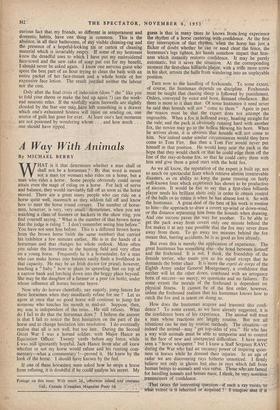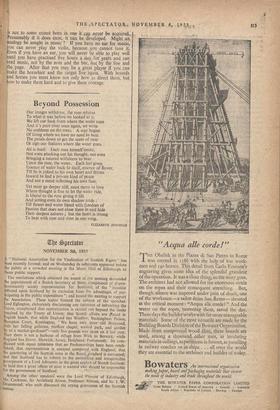A Way With Animals
By MICHAEL BERRY .
WHAT is it that determines whether a man shall or shall not be a horseman ? By that word is meant not a man (or woman) who rides on a horse, but a man who rides a horse. Some people obviously could never attain even the stage of riding on a horse. For lack of nerve and balance, they would inevitably fall off as soon as the horse moved. There are a great many people who can ride on a horse quite well, inasmuch as they seldom fall off and know how to steer the horse round corners. The, number of horse- men, however, is very, very small. Sometimes, when you are watching a class of hunters or hackers in the show ring, you find yourself saying, " What is the number of that brown horse that the judge is riding ?. I don't remember seeing him before." You have not seen him before. This is a different brown horse from the brown horse '(with' the same number) that carried his 'exhibitor a few minutes earlier. He is•in the hands of a horseman and that changes his whole outlook. More often you salute the horseman in the hunting field and very often on a young horse. Frequently he is a horsedealer, for a man who can make horses into hunters easily finds a livelihood in that capacity. He may be an Irish doctor (or priest), however, teaching a " baby " how to plant its sprawling feet on top of a narrow bank and lurching down into the boggy place beyond. She may be the daughter of a farmer or a peer (or both), under whose influence all horses become brave.
Now why do horses cheerfully, nay eagerly, jump fences for these horsemen when they steadfastly refuse for me ? Let us agree at once that no good horse will continue to jump for someone who touches his mouth in mid-air. Suppose, then, my seat is independent of the reins. He still refuses. What do I fail to do that the horseman does ? I believe the answer is that I fail to notice the first hesitation on the part of the horse and to change hesitation into resolution. I do eventually realise that all is not well, but too late. During the Second Great War I was a horsed soldier, with Major Hance as Equitation Officer. Twenty yards before any fence, while -I-was still ignorantly hopeful, Jack Hance from afar off kneW whether or not my horse would refuse and 'his running corn- mentary—what a commentary !—proved it. He- knew by the look of the horse. I should have known by the" feel.
If one of these horsemen were asked how he stops a horse from refusing, it is doubtful if he cOuld analyse his secret. My guess is that in many cases he knows from- long experience the rhythm of a horse cantering with confidence. At the first tiny interruption of that rhythm, when the horse has just a flicker of doubt whether he can or need clear the fence, the horseman's legs tighten, his hands somehow impart that firm- ness which instantly restores confidence. It may be purely automatic, but it saves the situation. At the corresponding moment the first-class billiards player, with a trifle more screw in his shot, arrests the balls from wandering into an unplayable position.
Turn now to the handling of foxhounds. To some extent, of course; the huntsman depends on discipline. Foxhounds must be taught that chasing sheep is followed by punishment. Orders, conveyed by voice and horn, demand obedience. But there is more to it than that. Of some huntsmen it need never be said that hounds will not " come to them." Again in part the reason must be that the expert does not attempt the impossible. When a fox is holloaed away, heading straight for the vale; and the pack is obviously running hard with another fox, the novice may go to the holloa blowing his horn. When he arrives alone, it is obvious that hounds will not come to him. Nor indeed under similar circumstances would they have come to Tom Firr. But then a Tom Firr would never put himself.in that position. He would keep near the pack in the hope that they would check or that he could edge them off the line of the stay-at-home fox, so that he could carry them with him and give them a good start with the bold fox.
As we all know, the reputation of the expert is built up, not so much on spectacular feats which retrieve almost irretrievable disasters, as on ability to keep the game running on fairly well-known lines which experience has shown to be productive of success. It would be fair to say that a first-class billiards player needs his brilliant shots Only in order to obtain control of the balls or-to retain it when he has almost lost-it. So with the huntsman. A great deal of the best of his work is routine to him—the approach to draw a covert up-wind or down-wind, or the distance separating him from the hounds when drawing. And one success paves the way for another. To be able to get the pack away from covert only one minute behind the fox makes it at any rate possible that the fox may never draw away from them. To go away ten minutes behind the fox means that, barring accidents, he is as good as lost already.
But even this is merely the application of experience. The great huntsman has something else—the bond between himself and the foxhound. It is not, I think, the friendship of. the fireside terrier, who treats you. as his equal except that he demands the better chair. It is more the esprit de corps of the Eighth Army under General Montgomery, a confidence that neither will let the other down, combined with an arrogance born of success—no mercy, no questions and no failures. To some extent the morale of the foxhound is dependent on physical fitness. It cannot be of the first order, however, unless the foxhound realises that his huntsman knows how to catch the fox and is intent on doing so.
How does the huntsman acquire and transmit this confi- dence ? To some extent, as we have already suggested, it is the confidence born of his experience. The animal will trust a man whose reactions' are largely routine. But not all situations can be met by routine methods. The Situation—or indeed the animal—may "get top-sides of you." 'He who has a way with animals must be able to temporise and to control in' the face of new and unexpected difficulties. I have never seen a " horse whisperer," but I knew a Staff Sergeant RAVC during the War who had an uncanny power of inspiring quiet- ness in horses while he dressed their injuries. In an age of radar we are discovering rays hitherto unnoticed. I firmly believe not only in ghosts but also in rays which fall from human beings to animals and vice versa. Those who are famed for handling hounds and horses must, I think, be very. sensitive transmitters, Of confidence.
That raises the interesting question—if, such a ray exists,•.to what extent is it inherited or acquired ? -1 imagine that it-it is not to some extent born in one it cap never be ocquired.., Presumably if it does exist, it tan be developed. Might an analogy be sought in music ? ' If you have no ear for music, you can never play the violin, because you cannot tune it. Even if you have an ear, you will never be able to play well until you have practised five hours a day for years and can read music, not by the note and the bar, but by the line and the page. After that you may be a great player if you can make the horsehair and the catgut live again. With hounds and horses you must know not only how to direct them, but how to make them hard and to give them courage.



































 Previous page
Previous page